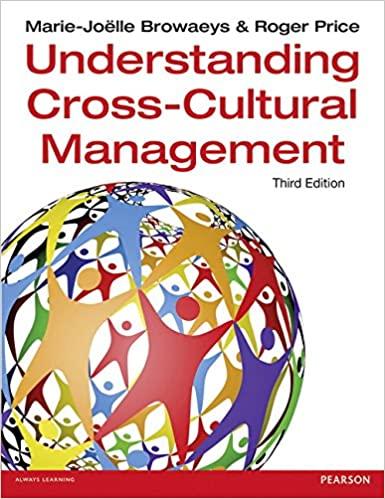Does Europe hate us? Thomas Friedman, the New York Times columnist, asked in a documentary on the
Question:
‘Does Europe hate us?’ Thomas Friedman, the New York Times columnist, asked in a documentary on the Discovery Channel last week. The answer, he concluded after pottering around the Continent looking increasingly worried, was ‘yes’. From the war on terror to attitudes to maternity leave, Mr Friedman’s film made it plain that Europeans inhabited a different world from Americans.
When it came to business, he portrayed a Europe whose bureaucrats plotted endlessly to make life difficult for US companies. Brussels was banning pharmaceutical ingredients regarded as perfectly safe in the US. European competition authorities had stamped on the ambitions of US companies from Microsoft to Coca-Cola.
His narrative punctuated by the sort of menacing soundtrack film-makers reserve for those moments before dad opens the door to discover that his family has been murdered by machete-wielding maniacs, Mr Friedman asked: ‘Is this the end of the west?’
Quite possibly – and it gets worse. According to a recent paper by John Coffee of Columbia law school, the US and Europe are so far apart that they even suffer from fundamentally different corporate scandals. 1 Take two emblematic examples: Enron in the US and Parmalat in Europe. The Enron misdeeds were aimed at boosting and maintaining the energy trader’s share price. At Parmalat, the dairy group, by contrast, money appears to have been siphoned off for the benefit of particular individuals.
The divergence refl ects underlying diff erences in the way US and European companies are organized, Prof. Coff ee argues. In the US, the typical company’s shareholders are a widely dispersed group. Being too fragmented to exercise day-to-day control over executives, they attempted to align top managers’ interests with theirs by granting them share options.
In 1990, the average chief executive of an S&P 500 Industrial company earned $1.25m (£660,000), of which 92 per cent was in cash and 8 per cent in equity. By 2001, the average chief executive was earning more than $6m, of which 66 per cent was in equity.
The prevalence of share options substantially changed US chief executives’ attitudes to presentation of their companies’ earnings. ‘During early periods, US managements famously employed “rainy day reserves” to hold back the recognition of income that was in excess of the market’s expectation in order to defer it until some later quarter when there had been a shortfall in expected earnings’, Prof. Coff ee writes.
‘Managers engaged in income smoothing, rolling the peaks in one period over into the valley of the next period. This traditional form of earnings management was intended to mask the volatility of earnings and reassure investors who might have been alarmed by rapid fluctuations.’
By the late 1990s, chief executives, stuffed with share options, were doing something different:
‘stealing’ earnings from future periods to create an ‘earnings spike’ to meet market expectations and prevent the share price from taking a dive.
‘Although such spikes may not be sustainable, corporate managers possess asymmetric information and, anticipating their inability to maintain earnings growth, they can exercise their options and bail out’, Prof. Coffee writes. He cites studies demonstrating a relationship between how extensively companies use options and the likelihood of their falling victim to fraud.
European companies, on the other hand, often have controlling shareholders or groups of shareholders, who do not need indirect mechanisms such as share options to control management.
They can simply tell them what to do. European chief executives have less freedom to manipulate their earnings. But they also have less incentive to do so.
Fraud still occurs in Europe, but it is a different sort of fraud and different people perpetrate it. Instead of executives manipulating earnings, dominant shareholders use their control to help themselves to the company’s assets.
Because European and US companies are vulnerable to different types of fraud, they should adopt different ways of preventing it. While US corporate governance reforms have concentrated, for example, on ensuring that independent audit committees deal with the auditors, this might be less effective in Europe where the board struggles to escape the controlling shareholder’s influence.
‘Although diligent auditors could have presumably detected the fraud at Parmalat . . . one suspects that they would have likely been dismissed at the point at which they began to monitor earnestly’, Prof. Coffee says.
He confesses he does not have a simple suggestion on how to prevent European-style frauds.
Regulators could require auditors to report to minority shareholders, he says, but he appears to accept this is unlikely to have many takers.
A second objection to his argument that European fraud is different from the American variety is that there are prominent exceptions. What about Ahold and Vivendi? Were not these European companies whose scandals involved earnings manipulation? They were, Prof. Coffee says, but that manipulation either happened in their US subsidiaries or in companies such as Vivendi that turned themselves into US-style conglomerates and therefore took an American form.
What of Tyco, a US company where the top managers allegedly appropriated assets for themselves?
Prof. Coffee acknowledges that the diff erences between US and European companies are overall tendencies rather than iron-clad rules.
In the polarized world described by Mr Friedman, I suppose we should take some comfort from the small number of Europeans and Americans imitating one another’s misbehaviour.
Question
Fraud seems to be a universal phenomenon. In this case, however, the author underlines the difference between committing fraud in the US and Europe. Can you explain how this difference comes about?
Step by Step Answer:

Understanding Cross Cultural Management
ISBN: 9781292015897
3rd Edition
Authors: Marie Joelle Browaeys, Roger Price





